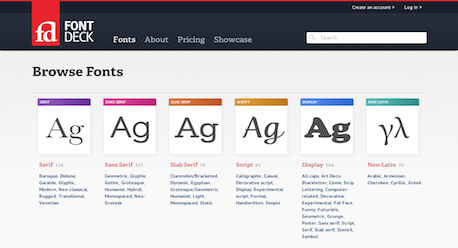Spotlight Fontdeck : Digital Rights Management
Fontdeckʼs mission is to provide custom fonts to users all around the world, in a simple, easy to use manner, that can work across browsers and on mobile devices. To achive that goal, the Fontdeck CDN is responsible for distributing fonts across the world while maintaining strong guarantees that the web site leveraging these fonts has paid for the rights to do so.

Because Fontdeck provides these guarantees in Javascript-free environments, it must implement the digital rights management (DRM) on the server side. This poses interesting resiliency and performance challenges. By moving the DRM statelessly to the edge of the CDN, resiliency was achieved, but the performance was a constant struggle. The first generation of Fontdeckʼs proprietary DRM system was built as an extension to version 2.2 of the Apache httpd server and achieved, at most, 6000 requests per second, with a limit of a few tens of thousands of clients. As Fontdeck’s business grew, it ran into an issue of scale; more performance and scalability in a single node would lead to better end-user experience, better business and more sustainable margins.
Our Solution
OmniTI selected Apache Traffic Server™ as a replacement platform for the edge CDN nodes because of its single system scalability, battle-hardened performance numbers, and advanced CDN-centric, distributed logging features. The challenge at OmniTI was to port the initial implementation to the new platform.
Over the course of one week, roughly 700 lines of Apache httpd module code was translated to roughly 900 lines of Apache Traffic Server plugin code, and a functionally equivalent replacement was put into testing. The new implementation, in a similar test scenario, services more than 45,000 requests/second and handles upwards of 1 million concurrent client connections. We were able to achieve a 10-fold improvement in single-system scalability.
We wanted to create a service that would bring high quality fonts to a wide audience. It needed to be supported with the best infrastructure to host and serve fonts.
~ Richard Rutter, CEO Clearleft.
